Holy Fascism
An Essay for Christmas
Most if not all political movements espouse what are called “sacred values" — certain values that are deemed to be supreme, incontestable, and inviolable to which they are devoted. But some political movements hold that sacred values are embodied in a single person, the sacred leader. Sacred leaders are messianic figures, who promise salvation for true believers. When a movement is headed by a sacred leader, it resembles a religion. In fact, I would say that such movements are religions, but that’s a topic for a future posting.
As you may have surmised by this point, this essay was prompted by Donald Trump’s impending second term in office. Trump is a sacred leader. His evangelical followers often refer to him as a “savior” or “anointed one” chosen by God to rule the nation. A video titled God Made Trump created by a group of MAGA supporters called the Dilly Meme Team, opens with the voiceover, “On June 14, 1946, God looked down on his planned paradise and said, ‘I need a caretaker.’ So God gave us Trump. ‘I need somebody willing to get up before dawn, fix this country, work all day, fight the Marxists, eat supper, then go to the Oval Office and stay up past midnight at a meeting of the heads of state.’ So God made Trump.”
It would be ludicrous if it were not so ominous.
Trump cultivates this image. He promoted the God Made Trump video and agrees with MAGA believers that almighty God saved him from his would-be assassins. Take a drive down Trump highway on Amazon, and you’ll discover books with titles such as God and Donald Trump; Trump Prophesies; Trump’s Unfinished Business:10 Prophesies to Save America; Trump’s Bible: How Donald Trump’s Words and Deeds Reflect God’s Teaching; Trump, Blessed, Donald J. Trump and the Spiritual War; and God and the 2020 Election. Some MAGA zealots even claim that the Coming of Donald Trump was prophesied in the biblical Book of Daniel (Warden, 2023). Trump is a sacred leader in the eyes of his true believers.
Although, as I’ve said, this essay was prompted by Trump’s re-election, I want to devote it to a different sacred leader: Adolf Hitler. National Socialism is a paradigmatic example of sacred leadership and true believership. Hitler was wrapped (and wrapped himself) in an aura of holiness, chosen by God to make Germany great again.
Many people with only a superficial knowledge of the Third Reich believe that Nazis were resolutely anti-Christian, and if not out-and-out atheists, then pagans who wanted to restore ancient Germanic rites. Heinrich Himmler and Alfred Rosenberg certainly fit this profile, but they were not typical, and Hitler sneered at their efforts. Some of the most powerful members of the Nazi elite—including Hermann Göring and Joseph Goebbels were Christians, and regarded National Socialism as a Christian Movement.
Hitler himself never renounced Catholicism and both lionized and identified with Jesus Christ. Richard Steigmann-Gall, a scholar of religion during the Third Reich, wrote in his book The Holy Reich: Nazi Conceptions of Christianity,
Until the end of his life he esteemed Christ, so much so that he decided it was necessary to rescue Christ from his own Jewishness. Even as Hitler’s anti-clericalism grew, his opinion of Jesus remained high. As he said to his confidants in October 1941: ‘The Galilian, who later was called the Christ…. must be regarded as a popular leader who took up his position against Jewry…He set himself against Jewish capitalism, and that is why the Jews liquidated him” …. However much Hitler claimed to be an enemy of organized religion, this conception of Jesus displayed…the retention of a specifically Christian dimension to his beliefs.
Hitler was anticlerical. He was opposed to the churches. But that’s not the same as being anti-Christian. His remark to Albert Speer that Islam and Shinto were more consistent with the Nazi spirit than “weak and flabby” Christianity is best understood in that context. Hitler and his cronies believed that he was executing God’s plan and that attempts on his life all failed because he was under divine protection.
More interesting than any of this, though, were the attitudes of the Nazi faithful.
Ian Kershaw writes in the first volume of his massive biography of Hitler that the Nazi movement was described as a “great awakening” and “a struggle…for the reshaping of the German soul” and remarks:
Eyewitnesses of…mass meetings in the presence of the Führer have testified that for those taking part the atmosphere and effect was closer to that of a religious than to that of a ‘normal’ political rally. There seems little doubt that for the millions who were already ‘Hitler believers’ or were in the process of ‘conversion,’ the ‘religious’ dimension was a powerful component of the ‘Führer myth‘….Goebbels’ own descriptions of major Hitler rallies and speeches frequently had a pronounced sacral tone, as in 1936 when he depicted Hitler’s ‘election’ speech in Cologne as ‘religion in the deepest and most mysterious sense of the word,’ in which ‘a nation professed its belief in God through its spokesman, and put its faith and life trustingly in his hands.
Here are some examples. A few of very many.
Louise Solmitz, a schoolteacher who was one of 120000 attendees at a Hitler rally wrote, “How men look up to him with touching faith! As their helper, their savior—their deliverer from unbearable distress.”
A poem commemorating Hitler’s ascendency in 1933, began, “Now has the Godhead a savior sent, Distress its end has passed.”
American journalist William Shirer recalled that the Nuremburg rally that he attended, “had something of the mysticism and religious fervor of an Easter or a Christmas mass in a great gothic cathedral…. I got caught in a mob of ten thousand hysterics who jammed the moat in front of Hitler’s hotel…. They looked up at him as though he were a Messiah, their faces transformed.”
Swiss philosopher Denis de Rougemont observed, “40000 arms are raised in a single movement…. They stand upright, unmoving, and shouting in time…I thought I was taking part in a mass rally, a political event. But they are celebrating their cult! A liturgy is being held here, the great sacred ceremony of a religion.”
Another eye witness stated, “We were in a hall, thousands and thousands of people….and everybody, men as well as women, abruptly began to tremble and weep, and howl, and all the while Hitler sat there without saying a word, without stirring, just staring at them.”
Reflecting on the experience of watching a film of the 1933 Nuremburg rally, German-Jewish linguist Viktor Klemperer wrote, “This whole National Socialist business is lifted from the political realm to that of religion…. people sit there piously rapt—no one sneezes or coughs, there is no rustling of sandwich paper, no sound of anyone sucking a sweet. The rally is ritualistic action. National Socialism is a religion.…”
Nazi artist Hermann Otto Hoyer chose the title In the Beginning Was the Word for his painting depicting Hitler, near the beginning of his political career, addressing a group of stormtroopers.
It wasn’t just ordinary folk who looked up to Hitler as a savior. Members of the Nazi elite shared the perspective. Propaganda minister Joseph Goebbels effused to his leader after he was found guilty in the aftermath of the Beer Hall putsch, “Like a rising star you appeared before our wondering eyes, you performed miracles…gave us faith. You towered above the masses, full of faith and certain of the future, and possessed by the will to free those masses with your unlimited love for all those who believe in the new Reich.” Hermann Göring—commander in chief of the Air Force and Hitler’s designated successor—exclaimed, “There is something mystical, inexpressible, almost incomprehensible about this one man…. We love Adolf Hitler because we believe, deeply and steadfastly, that he was sent to us by God to save Germany.”
As the God-appointed savior, the Führer was endowed with traditional attributes of the Abrahamic deity—omnipotence, omniscience, and omnibenevolence. In the words of one alter Kämpfer, a man who had joined the SA in the early years, “Naturally, we saw in Herr Hitler the man who knew everything, who could do everything, who would see everything through if he once had a chance to exercise power. He was already a model for us young National Socialists.” Even more explicitly, Hermann Göring proclaimed “We National Socialists declare with complete conviction that for us, the Führer is infallible in all political and other matters that affect the people’s national and social interests.”
Moreover, like the One True God, the sacred leader is supposed to be the only one able to deliver salvation. A 1941 book consisting of statements by Germans about what Hitler meant to them included, “Our Fuhrer is the most unique man in history. I believe unreservedly in him and in his movement. He is my religion.” . Julius Streicher, the editor of the Nazi rag Der Stürmer reminisced in his testimony at the 1946 Nuremberg war crimes trial that when he first heard Hitler speak, “my neighbor thought he saw a halo around his head, and I experienced something that transcended the commonplace.”
Naturally, Nazis often described opponents of the regime as satanic. As Joseph Goebbels put the point in has final broadcast on Hitler’s 56th birthday, just before the German surrender,
The most shining culture the earth has ever seen sinks in ruins and leaves only memories of the greatness of an age destroyed by satanic powers…. Opposing this apparently all-powerful coalition of destructive satanic forces brings with it tests and burdens of superhuman nature…. Once more the armies of the enemy powers storm against our defensive fronts. Behind them is the slavering force of International Jewry that wants no peace until it has reached its satanic goal of world destruction.
The notion of the Satanic Jew wasn’t a cheap metaphor. Many took it quite literally. For example, when the airship Hindenburg exploded in 1937 a Stürmer reader thought he could see a leering Jewish face in the billowing smoke. The editor found this entirely credible, responding, “Nature has here shown clearly and with absolute correctness the devil in human form.”
When God dies, life loses all meaning. The day after Hitler and Eva Braun killed themselves Joseph and Magda Goebbels got a doctor to sedate their six children, and then crush a cyanide pill in their mouths. Before she and her husband committed suicide, Magda wrote to her surviving adult son, “The world after the Führer and National Socialism will not be worth living in, and therefore I have taken my children away…. We have now only one aim, loyalty unto death to the Führer.”
The Goebbels family were not alone. There was a massive wave of German suicides, by Nazi officials and ordinary citizens, in the final months of the war. SThere were more than seven thousand in Berlin alone. A number of the suicides were prompted by fear of vengeance—rape and murder—by embittered Red Army soldiers, but many others were the result of despair from the collapse of the Nazi dream.
Innumerable Germans poisoned or shot themselves, including many high-ranking party officials and also 53 army generals, 14 air force generals, and eleven admirals (perhaps in part to avoid execution at the hands of the victors). But many ordinary German citizens followed a similar path, sometimes murdering their entire families before killing themselves.
Florian Huber details this spiritual desolation in her book "Promise Me You'll Shoot Yourself": The Mass Suicide of Ordinary Germans in 1945. He illustrates it with a quote from a memoir by Melitta Maschmann, who had been a committed Nazi: “I was filled with the hazy notion that ‘my world’ would be knocked out of its orbit in a cosmic catastrophe and that I—a tiny speck of dust—would be swept away with it into the darkness.” Huber adds,
The Germans’ incomprehensibly long resistance was not only a result of the regime’s coercive terror and propaganda. They were also driven by a fear of the void. The Führer had left them, the Reich was collapsing, leaving behind it a gaping void…. [T]hose who had believed in it…faced not just a collective loss of meaning but the threat of personal disintegration. The emptiness they felt was palpable.
Hitler is an extreme example of a sacred leader. Other would-be political saviors and their true believers display many of the same features, though usually to a lesser degree. Today, on the threshold of a second Trump presidency, it behooves us to look back on the past and learn for the future.


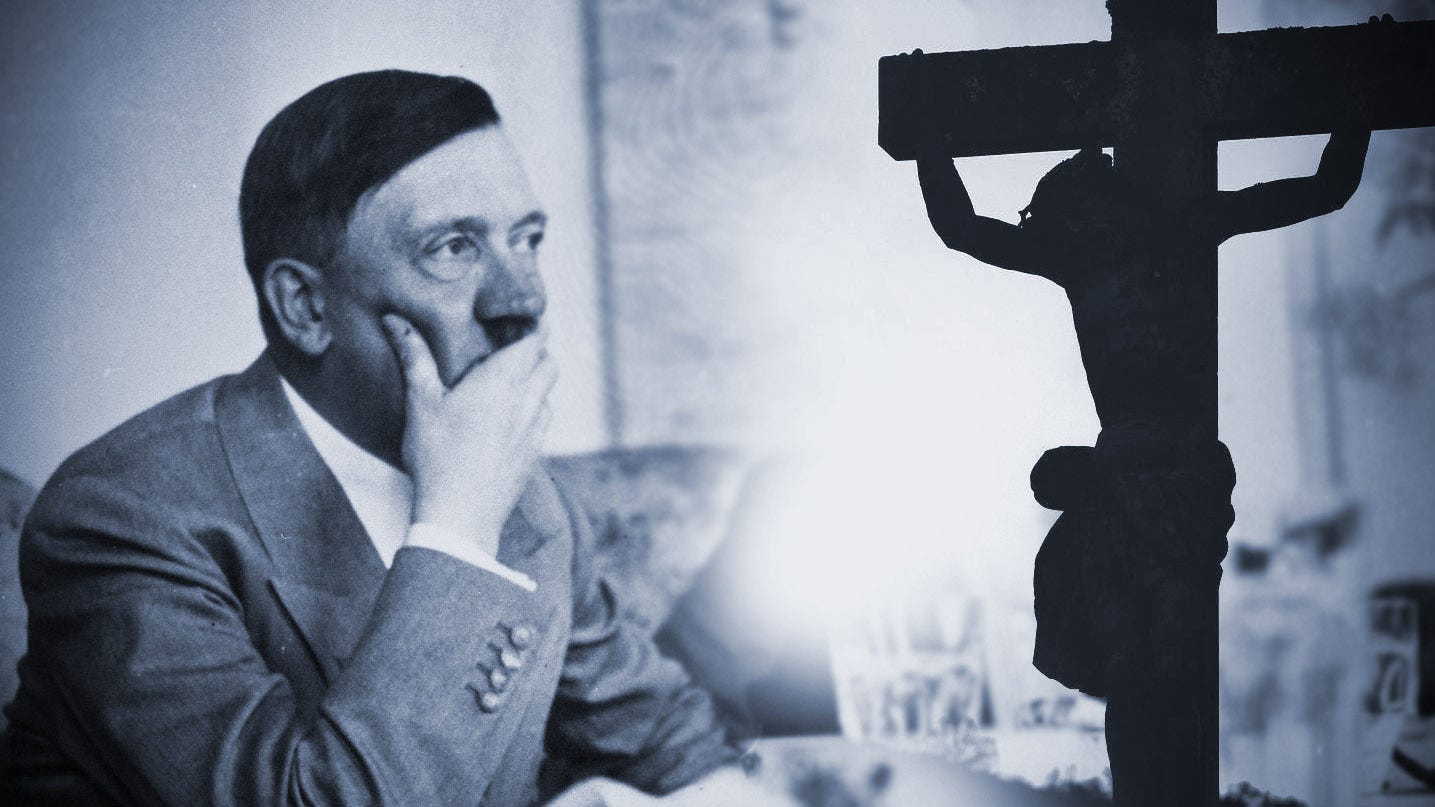
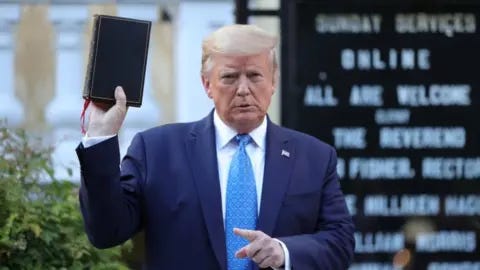
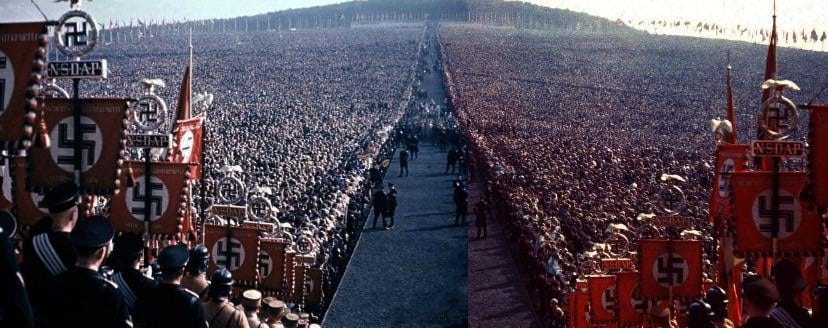
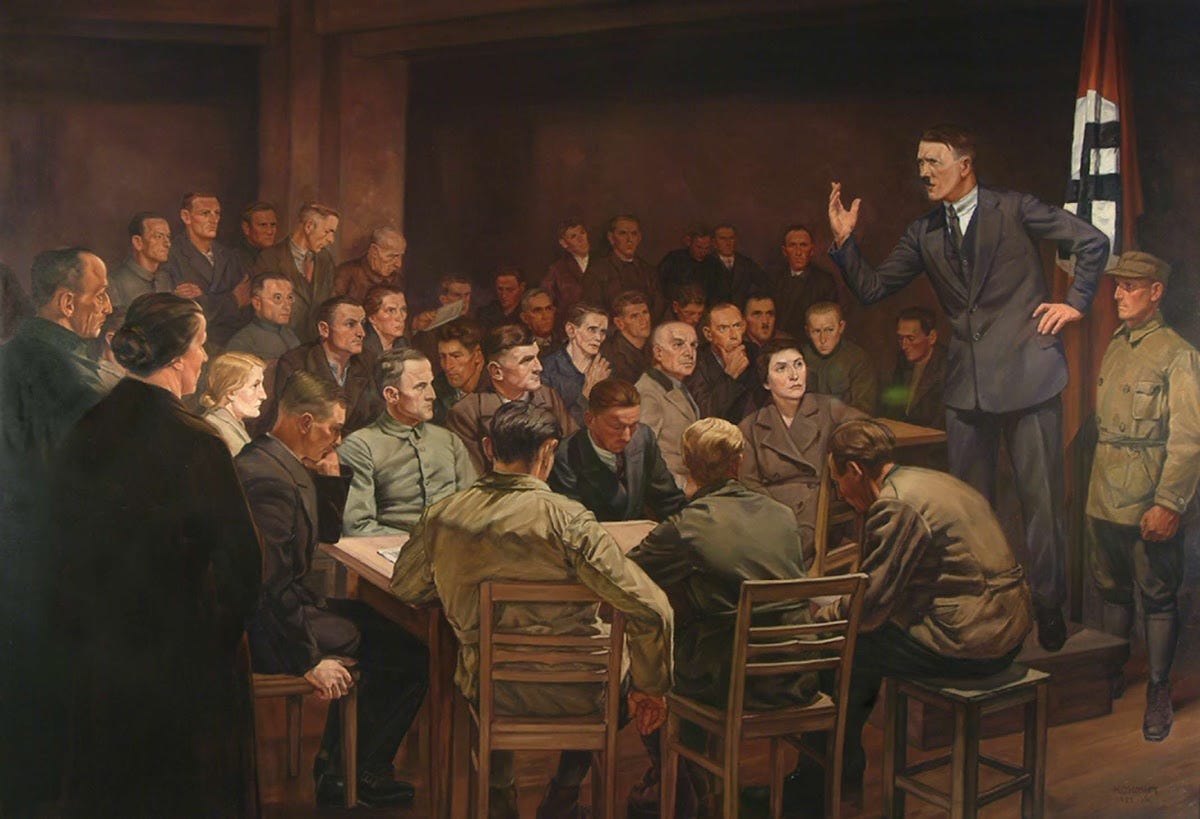

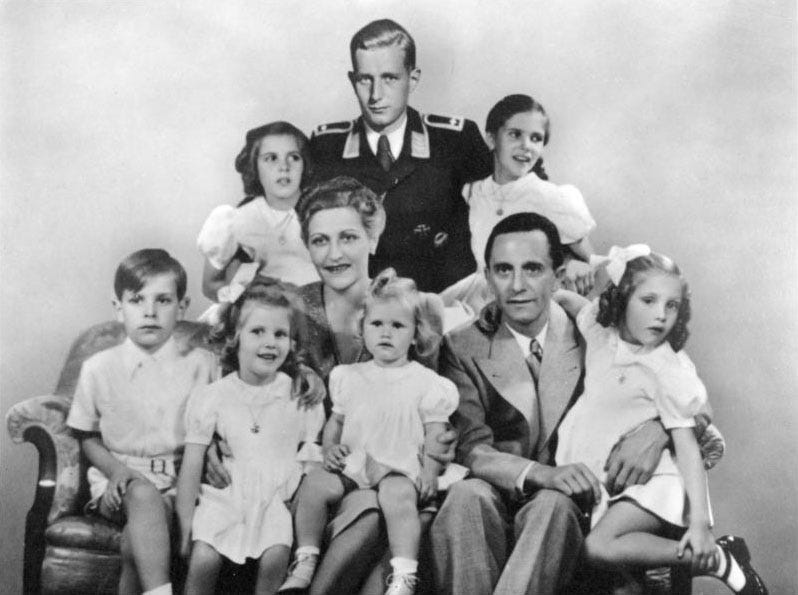
We seem to do this in cycles until we learn to keep our eyes open to everyone's humanity. We always seem to want to be saved from someone else by someone else but never to take responsibility for our membership in humanity by being good and demanding goodness.
Well done